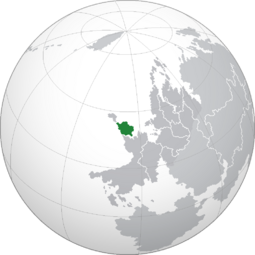User:Poshyte/Sandbox9
Fallish Federation | |
|---|---|
| Motto: A Reipublicae perpetuum A Republic forever | |
| Anthem: "Rose of Falland" | |
 Falland (green) within Berea (grey) | |
| Capital | Sydenham |
| Largest city | Kirmouth |
| Official languages | Fallish |
| Recognised regional languages | Abish |
| Ethnic groups (2015) | 85.3% Fallish background 24.7% Foreign background |
| Demonym(s) | Fallish |
| Government | Federal Semi-Presidential Republic |
• President | Libby Read |
• Prime Minister | Matthew Anderson |
• President of the National Assembly | Rhys Hart |
| Legislature | National Assembly |
| Establishment | |
• TBD | 30 February 0 |
• TBD | 30 February 0 |
• TBD | 30 February 0 |
• Monarchy Abolished | 2 October 1919 |
| 30 February 1920 | |
• Current constitution | 7 September 1954 |
| Area | |
• | 182,054 km2 (70,291 sq mi) |
• Water (%) | 0.6 |
| Population | |
• 2020 estimate | 18,569,508 |
• 2015 census | 17,182,992 |
• Density | 102/km2 (264.2/sq mi) |
| GDP (PPP) | 2021 estimate |
• Total | $787.012 Billion |
• Per capita | $42,382 |
| GDP (nominal) | 2021 estimate |
• Total | $742.446 Billion |
• Per capita | $39,982 |
| Gini (2021) | 29.8 low |
| HDI | 0.891 very high |
| Currency | Guild (ɢ) |
| Date format | dd-mm-yy |
| Driving side | left |
| Calling code | +20 |
| Internet TLD | .fl |
Falland, officially the Fallish Federation is a sovereign state in western Berea. It lies primarily on the island of will decide soon which is separated from mainland Berea by the Telmeric Sea and the Arthurean strait to the south. It shares maritime borders with Sarrac in the south and Sileria in the north-east. Falland spans an area of 182,054 square kilometres (70,291 square miles) with a population of 17,182,992 over it's TBD states. Falland's capital and political centre is Sydenham whilst it's largest city and financial centre is Kirmouth. Together the Kirmouth-Sydenham urban area is the largest urban area in Falland.
Falland was first inhabited by humans around 45000 BCE. Falland takes it's name from the Falko, a Telmerian tribe. Falland was invaded by the Cambran Empire in 85 CE. Despite their stronghold in the east of Falland the Cambrans had exceptional difficulty in exerting control over the Abish in the north-west leading to several wars and battles with the Cambran empire eventually emerging victorious. During the fall of the Cambran empire the Abish revolted and eventually pushed the Cambrans out of Falland. The Fallish population and remaining Cambrans then launched a revolt led by Wynnstan the Great against the Abish leading to a split on the island.
The Kingdom of Fallia was able to exert influence over it's area of the island despite regional differences. These differences proved too much to handle and the Kingdom collapsed in 988. The division in Fallia allowed the Sarraceses and Felghnezs to invade and conquer most of Fallia. During this period Fallia began exerting it's influence on Sileria Fallia remained divided until 1567 when the conclusion of the 17 Years' War led to the Kingdom of the Ossics united Fallia and invaded Sileria and Absaland. Sileria was integrated into Falland in 1741.
Falland was a major combatant in the Great War for the Armala Coalition, the Fallish army suffered severe casualties and a famine in Falland occurred leading to anti-Monarchist sentiment rising. The Silerian War for Independence fuelled anti-monarchist and pro-independence sentiment in Absaland. Absish nationalists declared independence in 1918 leading to the collapse of the the Fallish monarchy and the Declaration of the Republic of Falland. The Fallish civil war led to the Republicans eventually succeeding and annexing Absaland although granting it significant autonomy. The 1954 constitution formally established the Fallish Federation. In 1993 a referendum was held where 68% of Absish voters voted against secession but voted instead to further increase it's autonomy in Falland.
Today Falland is a high-income economy, Liberal democracy with strong connections to it's neighbours as seen in it's membership of the Fallish-Silerian council and the BDTA of which it is a founding member. Falland ranks highly in Standard of living, quality of life, education and Healthcare and is categorised as "very high" in the Human Development Index.

